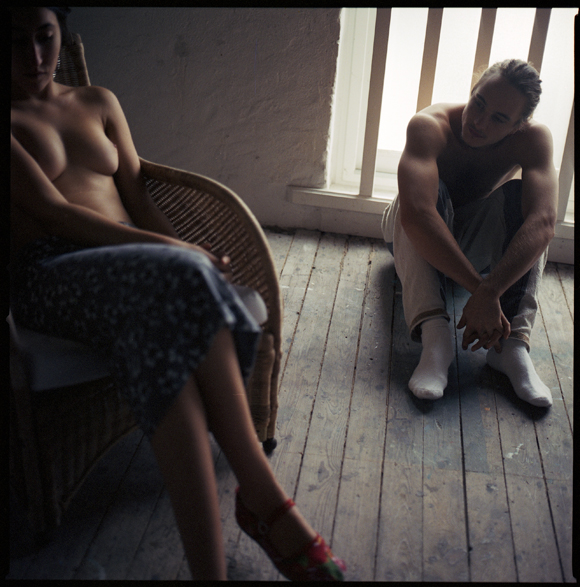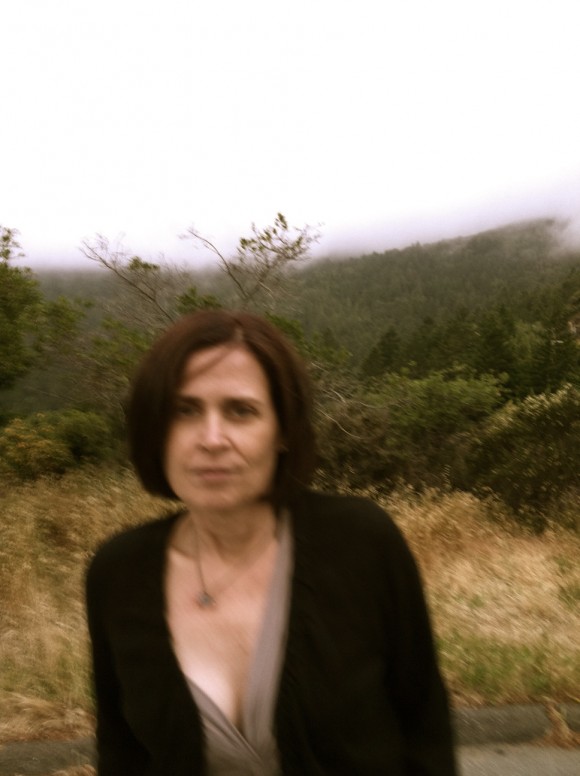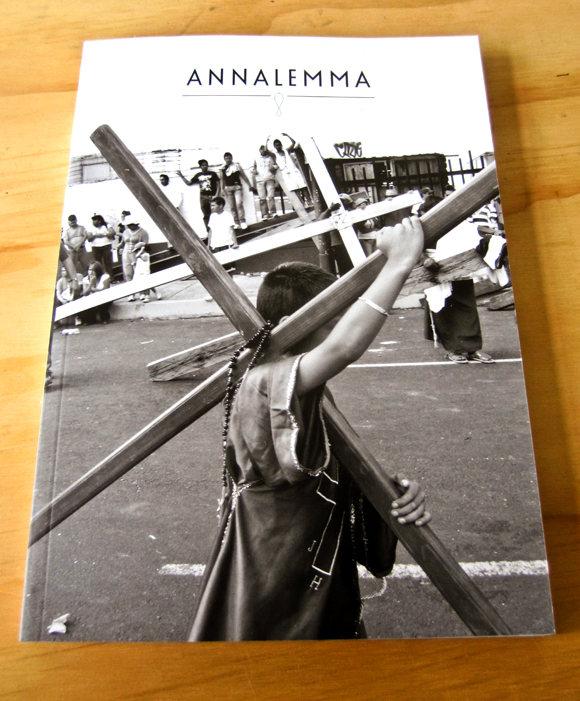{Image by Yann Faucher, excerpted from the story “Project” appearing in Annalemma Issue Eight: Creation}
I first got introduced to Peg Alford Pursell’s writing from the Burrow Press anthology “Fragmentation and Other Stories.” Pursell’s story (which the collection borrowed the title from) exemplified what good flash fiction should be about: showing a single important moment in a character’s life, a flare or fracture, which sets a larger action in motion, an action the reader can take with them to continue the story on their own. When we started reading for Issue Eight: Creation, Pursell submitted a story about a married couple experiencing such a fracture. The story further illustrated Pursell’s skills at showing the moments in relationships that are symbols of larger issues. I had a chance to speak with Pursell over Gchat about these moments, the novel she’s currently working on and the reading series she curates in the SF Bay Area, Why There Are Words
Annalemma: So are you in Sausalito at a writing retreat I understand?
Peg Alford Pursell: No longer at the writing retreat, sadly. Just home, in Sausalito, yes, where I live.
A: Tell me about the retreat, I’ve never been to one before but they seem really interesting, what was it like?
PAP: Well, this one was like no other one you’ve been to because it was self-created. I’ve been to residencies before and I’m applying for a couple for next year now. But, I decided I couldn’t wait around for that — I had the time now, a rarity. So I started checking out all kinds of possibilities, from a fairly local Zen center/organic farm to vacation beach rentals, etc. It was last minute, so hard to find something that quickly. Finally, I lucked out with a house-sitting situation for a young creative couple who needed someone to water plants and their garden. A really great cottage not far from me, so I didn’t have to waste a lot of time getting there. No TV, lots of art surrounding me, a wonderful porch where I could take my laptop and work. It was great. So for days on end, I could just live, breathe, dream the manuscript, no interruptions, my schedule entirely. Location was perfect — I took a lot of long walks through the hills or down through town when I needed to get the ideas flowing or sort out details, that kind of thing. I miss it!
A: That’s fantastic, sounds like a dream. I was imagining something closer to Jonathan Ames’s “Wake Up, Sir!” where a bunch of artists are jammed into a community together and end up causing all sorts of problems for each other.
So are you working on a novel right now?
PAP: Yes, I’m working on a novel told in — interconnected — stories.
A: How far along are you
PAP: Fairly close to done. A good draft of the story is complete. I’m working on a concluding “coda” or story, which just came to me, finally. I knew there was something yet missing; working on polishing the ms. — what’s there — at the retreat last week i got it. Naturally, this requires a reworking of the whole thing. But it’s good. It’s very exciting.
A: I know a lot of writers like to have everything in the can and all rewrites done before they start talking plot points and characters to outsiders. Can you say anything about what the book’s about?
PAP: Sure. It’s set on a fictional barrier island off the South Atlantic coast, loosely based on an island I lived on for a while, years ago. Mainly of the characters come from “off” — transplants from the north. Their lives intertwine and intersect in all sorts of complex ways. I’m most interested in exploring their relationships to themselves — surface and self — to their pasts, and to each other, and the idea of what it means to form a community.
A: That’s funny, I wanted to talk to you about the way you write relationships. In the story you wrote for the creation issue I liked the dynamic between the couple, even though it was a fractured one. I liked how the husband told his wife he wanted to have sex 2.5 times a week. A lot of times guys can be obsessed about whether or not we’re having sex “enough” and it can put a lot of undue stress on a relationship. It’s hard thing to create moments like this and make them feel genuine to a reader, how do you get to that point as a writer where you can show the relevant moments of a relationship?
PAP: Thanks for the kind words, Chris. I’m not sure I know. In many ways, it’s all relevant. But of course, you know that. Let’s see…
Sometimes, for me, it just “appears” or emerges that way. As in, with that particular story, that’s actually what I began with, what I heard first; the character, Martin, presented himself that way. That’s what was on his mind. In other cases, I may have to write a lot before I understand what are the relevant moments, and subsequently discard the rest.
A: I guess that’s what I was getting at. Writing, to me, feels like the ability to parse out what’s important and what’s not. That’s true that what’s “important” is all relative, but things need to be important to yourself before other people can regard them as important. You’re more likely to get excited or irritated about something if you think it’s important and that’s fuel to write. I guess for a lot of writers starting out though, it’s hard for them to figure out what’s important to them. Do you have any advice in that area?
PAP: I mean it’s what feels exciting or interesting to you — you can feel it, can’t you?
That’s what you go with. Sometimes a new writer may feel unsure about what resonates or interests her/him is going to matter to others. And then discards what excited or interested him/her. And in that case, I would say that’s a mistake. That it’s important to follow whatever that glimmer is. Trust that it will lead somewhere. It usually does, even if it fizzles out for some time (years, possibly). Later you see.
A: I’d agree with that, I’d say it’s important to follow some impulse, even if you end up abandoning it later on. It’s all a learning process, the greater mistake would be to hem and haw about what to do for months and years without actually producing anything
PAP: Yes, that’s a trap. There’s some kind of “rule” out there that says you throw away about 90% of what you produce. I remember Stephen Elliott saying this in a lecture/workshop we gave together last year. So you’ve got a make a whole lot to have anything, right?
A: Totally, I’m always interested to see how much writers have written before they’ve produced books. I love hearing stories about people who’ve got five novels and only one of them is published because that’s the only good one. I think that’s an untold reality a lot of people don’t understand.
There’s a lot of writers in the SF area, what’s the scene like? It’s pretty competitive here in New York.
PAP: Since I’ve never lived in NYC, I can only go on hearsay — what others say or have told me. First off, I’m new to SF myself (3 yrs) and I’ve never lived anywhere where’s there’s so much support and creative energy. Wish I’d moved here years ago. It’s been great for me. But I understand that isn’t simply my personal opinion, that others find it that way. I’ve lived in places where there’s little lit community, of isolation. That has its place, maybe, but it can be tough. It’s good to be where others care about words and creating, too.
A: I hear that. It’s a drag when you live in a city where it seems like you’re the only one who cares about books. That’s motivation enough to move sometimes, just to have good conversations. So how’d you get started writing?
PAP: Lifelong writer. In third grade I was prolific; my teacher, Miss Francis, read a story of mine to class at the end of each day while we were waiting for the bell to ring for dismissal. A few years ago I went to a class reunion and someone there reminded me of that.
A: That’s cool, It’s rare to have that sort of thing written into your DNA, but very cool when it happens. What can you tell me about Why There Are Words?
PAP: It takes place once a month (2nd Thurs.) Six writers, some with books, some not. It’s dedicated to the idea that good writing needs to be heard at any and all times and isn’t tied to the latest book coming into print. It’s all prose, though poets who write any kind of prose, including prose poetry, have read and are welcome. Prose since there’s another poetry series held in the same gallery a different night. It’s a lot of fun. Readers come from all over, and it stays booked out pretty far in advance, which is both great and hard, because there’s always more demand for spots than I can accommodate.
A: That’s great people are coming out and supporting it, another advantage to living in a lit-minded city like SF. I think that’s a good point to end on. Before we sign off I wanted see if you’d weigh in on an issue… NY lit scene vs. SF lit scene: tacit rivalry, tacit alliance or some mixture of the two?
PAP: SF, as far as my involvement or what I can see of it, is alliance. But there’s probably tacit rivalry, too — I mean of course there has to be. Maybe ask me in a few more years.
Thanks for this, Chris. It’s been great chatting. I think you should come out and read out here, and gauge the scene yourself. October is LItquake!
A: For sure, thank you, Peg. Let me know when those mags get there. Should be some time this week. I’d love to come out to SF, I haven’t been in years.
PAP: Do it!
A: You’re hyping me up now, I just might. That litquake sounds like fun.
PAP: Well, let me know. I’ve running a WTAW in Litcrawl. Also WTAW goes to AWP this year in Chicago.
A: Badass, I’ll be in Chicago for sure
PAP: Well, let’s meet up there, if not before.
A: Will do, thanks again, Peg!
PAP: Thanks to you, too.























Nice interview, Peg. I’ve been a fan of your work ever since Stories on Stage, when our short stories were performed. I’m looking forward to reading your book. My archaeological mystery, American Caliphate, is due out in December.